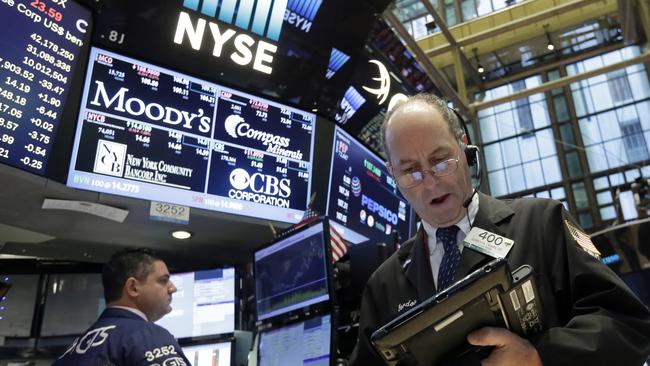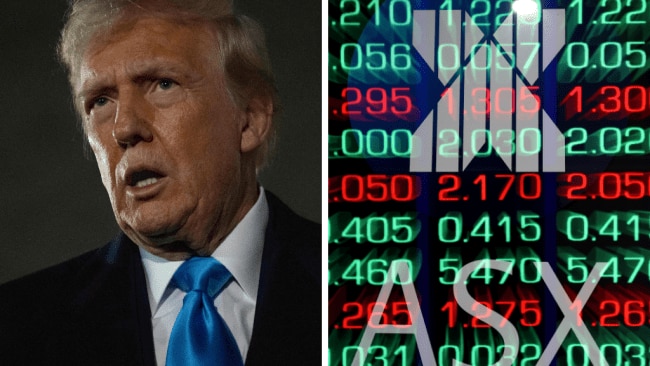Wall St drops 1pc on worries over Deutsche Bank
The ASX is set for a weak open after a report of hedge funds pulling cash from Deutsche Bank spooked investors.

A sell-off in bank and biotech shares dragged down US stocks as investors worried about a report of hedge funds pulling excess cash from troubled lender Deutsche Bank.
In Europe, markets were mostly higher, buoyed by yesterday’s OPEC deal to limit crude oil output.
The Australian share market is set to follow the leads from Wall Street and open lower this morning, with ASX futures down 40 points at 6.20am (AEST).
The Dow Jones Industrial Average fell as many as 248 points, reversing gains made a day earlier following a tentative deal between major oil-producing nations to cut production levels.
Some traders said the market was spooked by a report in Bloomberg News that said some funds that clear derivatives trades with Deutsche Bank have withdrawn some excess cash and positions held at the bank.
“The chatter is adding a lot of short-term fear right now, especially in the financials sector,” said Jonathan Corpina, senior managing partner at Meridian Equity Partners.
The Dow industrials dropped 196 points, or 1.1 per cent, at 18143 and the S&P 500 declined 0.9 per cent.
Financial shares in the S&P 500 dropped 1.5 per cent. Deutsche Bank’s US-traded stock fell 6.7 per cent. Goldman Sachs shares declined 2.8 per cent, Morgan Stanley lost 2.3 per cent and Citigroup fell 2.3 per cent.
Deutsche Bank’s shares have been watched closely by investors following The Wall Street Journal’s report earlier this month that the US Justice Department proposed that the lender pay $US14 billion to settle a set of high-profile mortgage-securities probes stemming from the financial crisis. The bank’s shares have fallen nearly 5 per cent in Frankfurt this week.
Mr Corpina said Thursday’s development sparked fear because it was reminiscent of the financial crisis, when reports of counterparties pulling back from trading with banks led to steep sell-offs.
The yield on the 10-year Treasury note fell to 1.556 per cent, according to Tradeweb, from 1.567 per cent Wednesday.
The Nasdaq Composite fell 0.9 per cent, dragged down by a second day of declines in biotech shares. The Nasdaq Biotechnology index has rallied this quarter as investors returned to riskier shares.
“The markets are jittery,” said Ray Moore, a trader at Raymond James. Without a strong showing from the next wave of earnings results, investors see little reason for stocks to rise further and are focused more on what can weigh on the market, he said.
Shares of Qualcomm rose 6.3 per cent after The Wall Street Journal reported the company was in talks to acquire Dutch firm NXP Semiconductors, which rose 17 per cent.
Oil prices rallied for a second session, though analysts and investors questioned whether members of the Organization of the Petroleum Exporting Countries would stand by the agreement and how much impact the output cuts would have on the world’s supply glut.
US crude-oil prices gained 1.7 per cent to $US47.83 a barrel after rising more than 5 per cent a day earlier.
Investors were also assessing the latest US economic data for their possible impact on the Federal Reserve’s plan for interest rates.
On Wednesday, Fed Chair Janet Yellen said interest-rate increases were on the way but that there was “no fixed timetable.”
The Commerce Department said Thursday that the US economy grew at a faster pace in the second quarter than previously estimated. However, the data showed the expansion decelerated in the first half of the year. Data from the Labor Department showed the number of Americans applying for first-time unemployment benefits rose last week but remained at a low level.
Utilities shares — popular this year while rates have been low because they tend to pay steady dividends — fell 1.5 per cent in the S&P 500.
“If there’s ever a perception that the Fed might raise rates, there’s a bit of a pullback in equities and utilities become less attractive,” said Ian Winer, head of the equities division at Wedbush Securities.
Fed funds futures, used by investors and traders to place bets on central-bank policy, showed a 56 per cent probability of an interest-rate increase from the Federal Reserve by December, according to data from CME Group, up from 53 per cent a day earlier.
The WSJ Dollar Index, which tracks the US currency against 16 others, rose 0.3 per cent.
Earlier, Asian shares rose following the OPEC news, led by a 1.4 per cent climb for Japan’s Nikkei Stock Average. The Stoxx Europe 600 was little changed despite gains in oil-and-gas shares and basic-resources stocks.
Dow Jones






